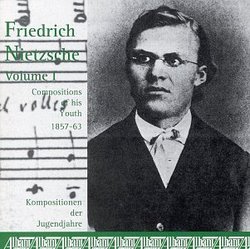| All Artists: Erik Oland, Friedrich Nietzsche, Wolfgang Bottenberg, Lauretta Altmann, Valerie Kinslow Title: Friedrich Nietzsche: Compositions of his Youth (1867-63), Vol. 1 Members Wishing: 0 Total Copies: 0 Label: Albany Records Release Date: 1/23/1996 Genres: Dance & Electronic, Special Interest, Pop, Classical Styles: Marches, Vocal Pop, Opera & Classical Vocal, Instruments, Keyboard Number of Discs: 1 SwapaCD Credits: 1 UPC: 034061017820 |
Search - Erik Oland, Friedrich Nietzsche, Wolfgang Bottenberg :: Friedrich Nietzsche: Compositions of his Youth (1867-63), Vol. 1
 | Erik Oland, Friedrich Nietzsche, Wolfgang Bottenberg Friedrich Nietzsche: Compositions of his Youth (1867-63), Vol. 1 Genres: Dance & Electronic, Special Interest, Pop, Classical
|
Larger Image |
CD Details |
CD ReviewsNietzsche's Music John Bell Young | USA | 05/20/2003 (2 out of 5 stars) "Someone remarked here, incorrectly, that Nietzsche was a "great pianist'. On the contrary, he was barely an amateur, and was entirely self- trained. My remarks here proceed from my own research and experience, to whit, my two recordings on the Newport Classics label of Nietzsche's piano and chamber music (whit tenor John Aler, violinist Nicholas Eanet and other friends and members of the Nietzsche Music Project) These were the first major survey of Nietzsche's musical works, and the first commercially produced recordings of his music ever made. They are not currently in print, though Sony Classical, which now owns them, plans to eventually re-release them. As for another person's dismissive remark that Nietzsche could perhaps write "pleasant' music, I can only say that the gentleman is misinformed, as even a cursory examination of Nietzsche's compositions reveals, to speak nothing of a detailed analysis. Nietzsche's music is anything *but* pleasant, nor did making it a matter of easy listening even remotely confrom to his aesthetic ideal. He consistently demonstrates and conveys, in compositional categories, a genuine grasp of compositional conflict as a means of conveying substantive ideas; an appreciation of complexity, as a haunting work as forward-looking as "Der Junge Fischerin" so admirably proves; and above all, the music does nothing if not convey the inner conflicts and pain that defined him spiritually and intellectually. Indeed, Nietzsche, though an amateur, could have become a great composer. Though awkward in its formal construction, his harmonic language is at once cunning and imaginative, while his intuitive grasp and command of musical metaphor is extraordinary in some very significant ways that do a good deal more than reflect the influence of Schumann (though not so much Wagner as one would think. It is a pity that the writers the gentleman cites were also misinformed; indeed, the fact is that these academic purists, who knew only Nietzsche s writings and that his musical ambitions, had no direct knowledge whatsoever of his musical compositional his music was not even published or available unitl the the 1970s, and what's more, it was never performed or recorded until I did so in 1990. (save for a few of the lieder, which Fischer-Dieskau recorded in the mid 1960s) So their critiques of Nietzsche's musical abilities are not only demonstrably specious, but proceed from the most appalling vanity and willful ignorance of the facts. One of the problems with such ludicrous citations is that these so-called critics of his music were not musicians, nor even qualified to endeavor in the intensely analytical and specific area of music criticism. For those who wish to know more about Nietzsche and his music, from the perspective of the foremost musical authorities in this area who have examined every nook and cranny of Nietzsche's musical works, as well his literary output, pay a visit to the Nietzsche Music Project's website ...The NMP is about to release a new 2 CD set of the works, which is certainly the best recordings of the music currently available. The performances on the disc in question are a brave effort, and the performers are to be commended for trying so hard, but are frankly not up to par. They are largely amateur, and do not represent the music at all well; the playing is, on the whole, fairly sloppy; the singing is dreadful even on those rare occasions when it is in tune; and the heavy-handed and strained, technically incompetent and inarticulate piano playing is utterly incapable of conveying anything discrete or compositionally specific either about the inner workings or the complexities of the music on its own terms, and least of all
for that which transcends it (for example, there is much to observe and illuminate in the auto-biographical musical trilogy that comprises the violin piece "Sylvesternacht", the Manfred Meditation and the other large scale 4 hand work, "Nachklang einer Sylvesternacht") On top of that, the recording is poorly engineered. That said, even the Bottenberg discs are superior to the inappropriately didactic and grotesque distortions of the Letanova recording, which is a total catastrophe from first note to last; at least Bottenberg does not indulge in a total misunderstanding of Nietzsche's aesthetic viewpoint, nor delude himself into thinking he's playing Rachmaninoff. The late Walid Akl's recording is professional enough; he plays everything as if it were Russian virtuoso music. But once again, he proves that, unless one does the real work, and examines this music in detail, and not in a vacuum, but in relation Nietzsche's philosophical ideas, poetry, and literary style, that it will emerge as something less than the sum of its many parts. These are hardly works that one can just "wing" and play after a few weeks of study.JOHN BELL YOUNG" |

 Track Listings (25) - Disc #1
Track Listings (25) - Disc #1